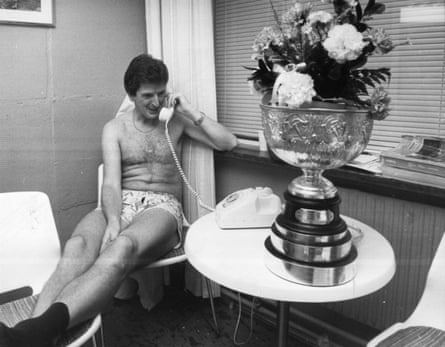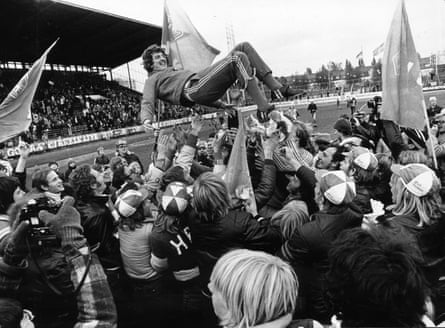Roy Hodgson celebrates his 76th birthday on Wednesday but any festivities are likely to be short-lived. His focus will very much be on preparations for Crystal Palace’s opening fixture at Bramall Lane on Saturday afternoon.
When Hodgson takes charge of his 1,242nd match at the weekend, he will extend his record as the oldest Premier League manager over another former England boss. Sir Bobby Robson was in his 72nd year for his last game as Newcastle manager in August 2004. If Hodgson is still in his job by the end of the season, he will be almost six years older than his nearest challenger.
Robson was instrumental in guiding Hodgson through the early stage of his career. “Roy joined the Surrey coaches association,” says Alan Smith, another former Palace manager. “This group consisted mostly of coaches who were not top players, but who had a teaching background [Hodgson worked at a couple of schools in south London]. At the time there was a negative attitude towards anyone entering coaching who had not played the game at the highest level.” Robson was more open-minded, encouraging coaches who had not been elite players to spend some him with him at Ipswich observing his methods – an initiative that Robson funded himself.
Hodgson and Robson are two of the five managers who have taken charge of Premier League teams in their seventies. Sir Alex Ferguson was 71 when he presided over his last match in 2013, a memorable 5-5 draw against West Brom at the Hawthorns. The Huddersfield manager, Neil Warnock, was also 71 when he led Cardiff to victory in their final match of the 2018-19 season at Old Trafford. And Claudio Ranieri was appointed by Watford in the same month as he turned 70. After a characteristically brief spell of just three months at the club, he was replaced by Hodgson himself in January 2022.
In a career that has spanned six decades, spread across six different countries as a club manager – plus four roles in charge of national teams – his longevity is matched by his cosmopolitanism. Hodgson speaks several languages – Swedish, Italian, French and German. The most travelled of his Premier League peers is Ange Postecoglou who, prior to starting at Tottenham, managed clubs in four different countries – Australia, Greece, Japan and Scotland, as well as being manager of the Australia national team. In contrast Mikel Arteta, Steve Cooper, Sean Dyche, Eddie Howe and Rob Edwards have never managed outside the UK.
Hodgson started his managerial career outside his own country. Only a few other Premier League managers have gone overseas for their first job: Mauricio Pochettino began his managerial career in Spain, having retired as a player at the Spanish club. Arteta took his first job at Arsenal having worked with Manchester City under Pep Guardiola, and Andoni Iraola, another Spanish manager, began in Cyprus at Larnaca.
“Going abroad was Roy’s best option,” Smith says. “Domestically, it would have been more difficult to find a role as there were limited openings in the English game for those without a playing pedigree.” Hodgson’s first managerial role came through an old school friend, Bobby Houghton, who was born within three months of Hodgson in 1947. They attended John Ruskin school in Croydon together but their managerial careers intertwined in southern Sweden rather than south London.
Houghton left England in 1974 to take over as Malmö manager. He enjoyed considerable success in his six-year spell, even reaching the European Cup final in 1979. His side lost 1-0 to Brian Clough’s Nottingham Forest but it remains the only time a Swedish club has reached the final of Europe’s elite competition.

A few years into his stint at Malmö, Houghton recommended Hodgson to another Swedish club, Halmstad, and his fellow Croydonian followed in his footsteps, spending a dozen years in Sweden with four different clubs. In the late 1980s Hodgson built on the foundations laid by Houghton at Malmö, establishing them as the pre-eminent club in Sweden, winning five Allsvenskan titles and two domestic cups during his five years in charge.
Graham Potter, another Englishman who made his name as a manager in Sweden, says Houghton and Hodgson are still held in the highest esteem there. Potter moved to Östersund in 2011 – just as Hodgson was joining West Brom, the 15th club in his career – and he soon realised the legacy Hodgson had left in Sweden. “It wasn’t until I got over there that I understood,” Potter said. “I followed Roy’s career from where he went in Sweden. He’s an experienced football guy. You won’t get many more experienced in world football than Roy Hodgson in terms of his variety of experience. In Sweden, he’s a legend.”
David Moyes is the second oldest manager in the Premier League, despite being 13 years younger than Hodgson. When Moyes began his playing career at the Icelandic club IBV, Hodgson was already a couple of years into his first job at Halmstad and was on the verge of winning the Swedish championship for the second time, having won the title for the first time in the club’s history in his debut season. Indeed, when Hodsgon took the reins at Halmstad in 1976, half of the Premier League managers were not even born.
Vincent Kompany is the youngest manager in the league and, at 37, he is less than half Hodgson’s age. When the Belgian started as a youth player at Anderlecht in 2003, Hodgson was in his 14th managerial role as boss of the United Arab Emirates national team.

The longest time Hodgson has spent out of the game was the 15 months between leaving the England job after Euro 2016 and returning to his boyhood club Crystal Palace in September 2017 following Frank de Boer’s disastrous spell. Having unofficially retired several times, he will be back in the dugout this weekend for his 41st season as a club manager.
His longevity is all the more remarkable given the ruthless short-termism of football management. Why does he keep doing it? “He is in love with coaching,” says Smith. “He’s a disciple of coaching. He doesn’t get sidetracked and, unlike so many others, he doesn’t get involved in areas outside of coaching.” As he celebrates his 76th birthday, Hodgson will be where he is happiest: among the familiar surroundings of bibs and cones. Long may he continue.

